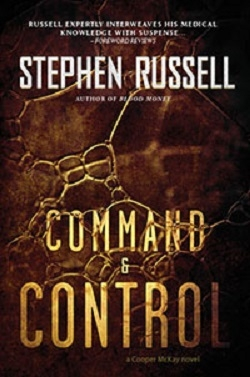Command and Control
A likable protagonist with humor and medical knowledge propels the plot of this exciting thriller.
Retired surgeon Cooper “Mackie” McKay returns in his second thriller outing by Stephen Russell, Command and Control. As with the first book in the series, Mackie finds himself in the middle of a medical crisis of global and deadly proportions. This time, his attempt to rescue a dying passenger aboard a flight is greeted with an overuse of force from the military. As the good doctor tries to discover the cause for this hostility, it eventually becomes apparent that more lives may be at stake than just that of his dying patient.
Russell once again delivers the elements that made his first book so successful: a likable character in Mackie, who is at once both hero and confused Everyman, with helpful medical knowledge, and a dash of humor to boot. Additionally, Russell ratchets up the tension and keeps it high through well-placed use of sentence fragments.
A relatable protagonist and descriptive high-octane writing do not stop this book from having stereotypical characters, though. The woman aiding Mackie this time around is exoticized for her Brazilian heritage and needs Mackie to save her. Moreover, the book falls back on the tired trope of the disabled villain, often mentioning his handicap in ways that seem to underscore his malevolence.
While enough suspense exists in the novel to propel it along, the plot as described in the back matter of the book does not really get into full swing until roughly page 120. With the military, Big Pharma, and the CDC all jockeying for air time in this novel, it becomes confusing as to why each party is acting the way it is, and, indeed, why all these agencies are cluttering up the book in the first place.
The book would have been better served if the conspiracies the author developed had fewer wrinkles and fewer key characters appearing later in the text. Readers should be well-versed in the field of medicine, as the author uses medical terminology without providing sufficient context clues for the uninitiated.
One hopes Russell can marshal his demonstrable talent to give future installments the lucidity that made the first shine.
Reviewed by
Jill Allen
Disclosure: This article is not an endorsement, but a review. The publisher of this book provided free copies of the book to have their book reviewed by a professional reviewer. No fee was paid by the publisher for this review. Foreword Reviews only recommends books that we love. Foreword Magazine, Inc. is disclosing this in accordance with the Federal Trade Commission’s 16 CFR, Part 255.

